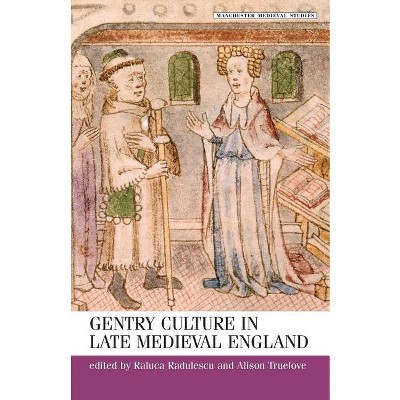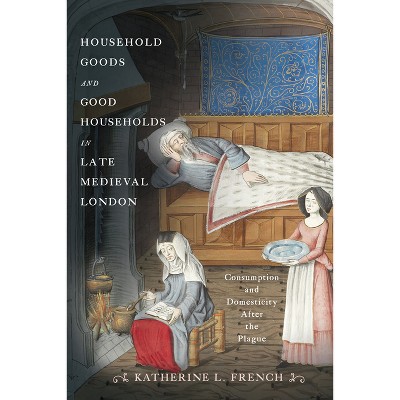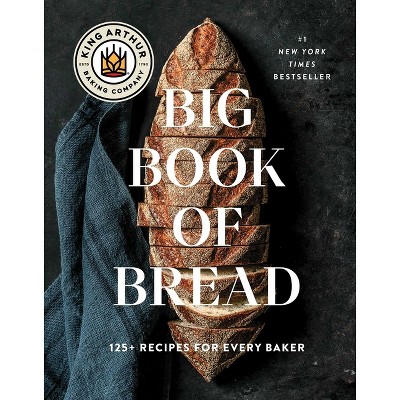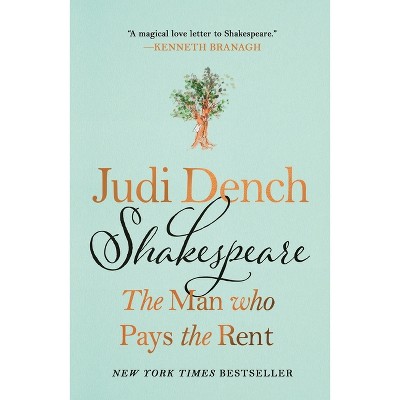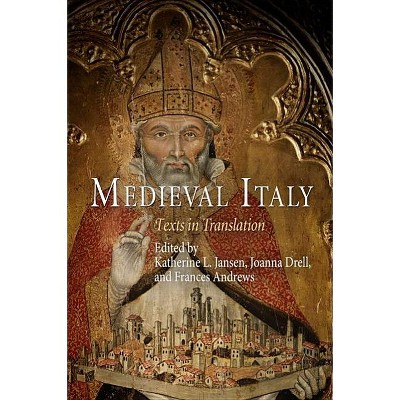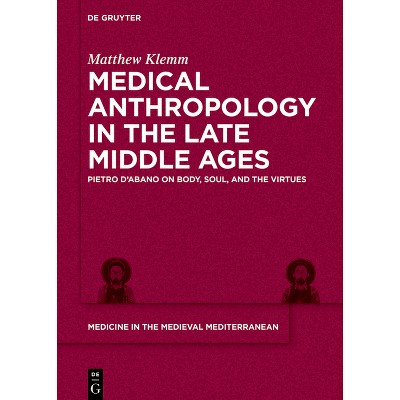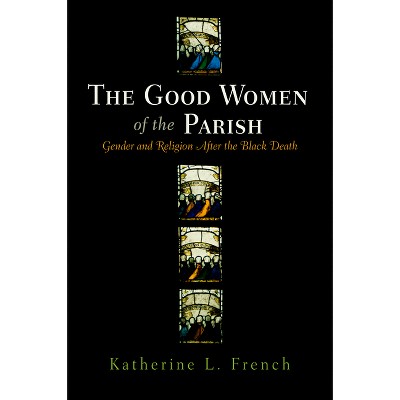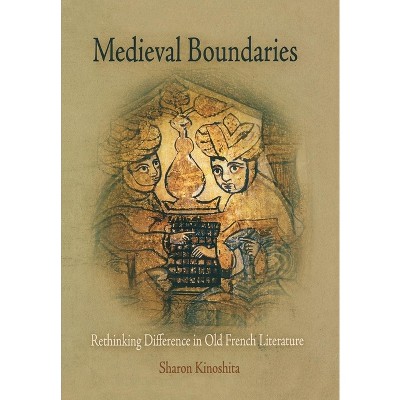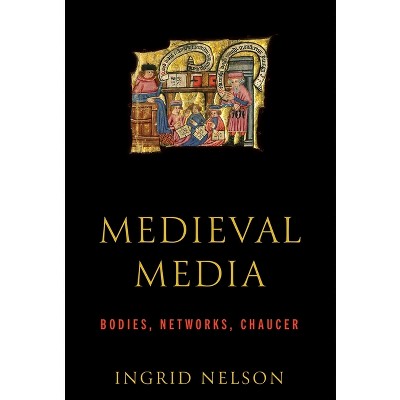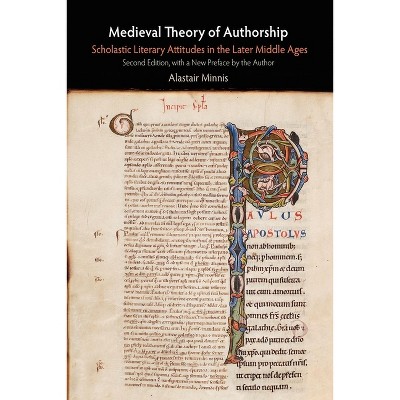Household Goods and Good Households in Late Medieval London - (Middle Ages) by Katherine L French

$34.95 when purchased online
Target Online store #3991
About this item
Highlights
- The Black Death that arrived in the spring of 1348 eventually killed nearly half of England's population.
- About the Author: Katherine L. French is J. Frederick Hoffman Professor of History at the University of Michigan and author of The People of the Parish: Community Life in a Late Medieval English Diocese and The Good Women of the Parish: Gender and Religion After the Black Death, both published by the University of Pennsylvania Press.
- 336 Pages
- History, Europe
- Series Name: Middle Ages
Description
Book Synopsis
The Black Death that arrived in the spring of 1348 eventually killed nearly half of England's population. In its long aftermath, wages in London rose in response to labor shortages, many survivors moved into larger quarters in the depopulated city, and people in general spent more money on food, clothing, and household furnishings than they had before. Household Goods and Good Households in Late Medieval London looks at how this increased consumption reconfigured long-held gender roles and changed the domestic lives of London's merchants and artisans for years to come.
Grounding her analysis in both the study of surviving household artifacts and extensive archival research, Katherine L. French examines the accommodations that Londoners made to their bigger houses and the increasing number of possessions these contained. The changes in material circumstance reshaped domestic hierarchies and produced new routines and expectations. Recognizing that the greater number of possessions required a different kind of management and care, French puts housework and gender at the center of her study. Historically, the task of managing bodies and things and the dirt and chaos they create has been unproblematically defined as women's work. Housework, however, is neither timeless nor ahistorical, and French traces a major shift in women's household responsibilities to the arrival and gendering of new possessions and the creation of new household spaces in the decades after the plague.Review Quotes
"Household Goods and Good Households is an impressive achievement. Its documentation of the material lives of London citizens, from wealthy merchants to middling craftsmen, across the great divide of the Black Death is revelatory; her argument about cultural change in the face of demographic catastrophe is compelling; and her prose is refreshingly readable."-- "EH.net"
"Household Goods offers a detailed analysis of the inventories, wills and testaments of later medieval London. It is both easy to read and enjoyable. French provides a real insight, not only into how people might experience and understand household goods, but also how these goods affected, and were tied to, people's social relationships and identities."-- "Urban History"
"[A]n immensely evocative and rewarding study of the relationship between people and things in London between 1300 and 1540...One of the many strengths of Household Goods and Good Households in Late Medieval London lies in the manner in which French has brought together the textual evidence with the archaeological and museological record. The work as a whole provides a marvelous introduction to material culture in London before and after the Black Death, and a new framework for writing a history of the complex interactions between people and their material environment."-- "The Medieval Review"
"[W]as the plague the end of something, or the beginning? Was it the devastating calamity that ended two centuries of population growth and economic expansion in England, or the foundation of a new 'golden age' in the long 15th century (c.1380-1520) for workers, who leveraged their labour power into higher wages, a better quality of life and a mountain of consumer goods? Katherine French provides a new angle on these questions by considering domestic life and material culture in London...French's evidence takes us into the emotional world of late medieval London, but her materials--all the sentimental wills and cold-eyed inventories--emphasise the pain of accumulation, the vexed moments at which objects are invested with an excessive love."-- "London Review of Books"
"Katherine French has written a stimulating book that convincingly uses documentary sources such as inventories and wills not only to retrace where and how people lived in late medieval London but also to reconstruct their lives, their emotions, and their aspirations as they rearranged their lives after the catastrophe of the Plague...French has given us much to consider about how our current crisis may relate to what late medieval people experienced and how these events may have left their traces in the material culture of their homes and bodies."-- "Early Modern Women"
"Katherine French's latest book is an important contribution to the history of material culture, viewed from the expert standpoint of a historian steeped in late medieval English life...Changes in volumes and types of goods brought changes in both standards and ways of living, for social change was imbricated with material goods. The evidence presented here is compelling in so many ways: questions of gender, of household management, of personal religion...[O]ne cannot fail to be impressed by this view of the quotidian life of England's capital, and by the skill and depth of knowledge with which French has presented it to us."-- "Speculum"
"Katherine L. French offers an original and convincing hypothesis about a distinctive mercantile and artisanal culture that is not merely emulative of elite consumption practices, but rather innovative and adaptive. Throughout, she explores the relationship between gender, 'stuff, ' and the lifeways and rituals associated with household work, food, and childbirth. More broadly, she makes a powerful contribution to wider historical and sociological discussions about the relationship between people and their things."-- "Kate Giles, University of York"
About the Author
Katherine L. French is J. Frederick Hoffman Professor of History at the University of Michigan and author of The People of the Parish: Community Life in a Late Medieval English Diocese and The Good Women of the Parish: Gender and Religion After the Black Death, both published by the University of Pennsylvania Press.Dimensions (Overall): 9.25 Inches (H) x 6.12 Inches (W)
Suggested Age: 22 Years and Up
Number of Pages: 336
Genre: History
Sub-Genre: Europe
Series Title: Middle Ages
Publisher: University of Pennsylvania Press
Theme: Great Britain
Format: Paperback
Author: Katherine L French
Language: English
Street Date: November 11, 2025
TCIN: 1001744793
UPC: 9781512828658
Item Number (DPCI): 247-40-7289
Origin: Made in the USA or Imported
If the item details above aren’t accurate or complete, we want to know about it.
Shipping details
Estimated ship dimensions: 1 inches length x 6.12 inches width x 9.25 inches height
Estimated ship weight: 1 pounds
We regret that this item cannot be shipped to PO Boxes.
This item cannot be shipped to the following locations: American Samoa (see also separate entry under AS), Guam (see also separate entry under GU), Northern Mariana Islands, Puerto Rico (see also separate entry under PR), United States Minor Outlying Islands, Virgin Islands, U.S., APO/FPO
Return details
This item can be returned to any Target store or Target.com.
This item must be returned within 90 days of the date it was purchased in store, shipped, delivered by a Shipt shopper, or made ready for pickup.
See the return policy for complete information.


